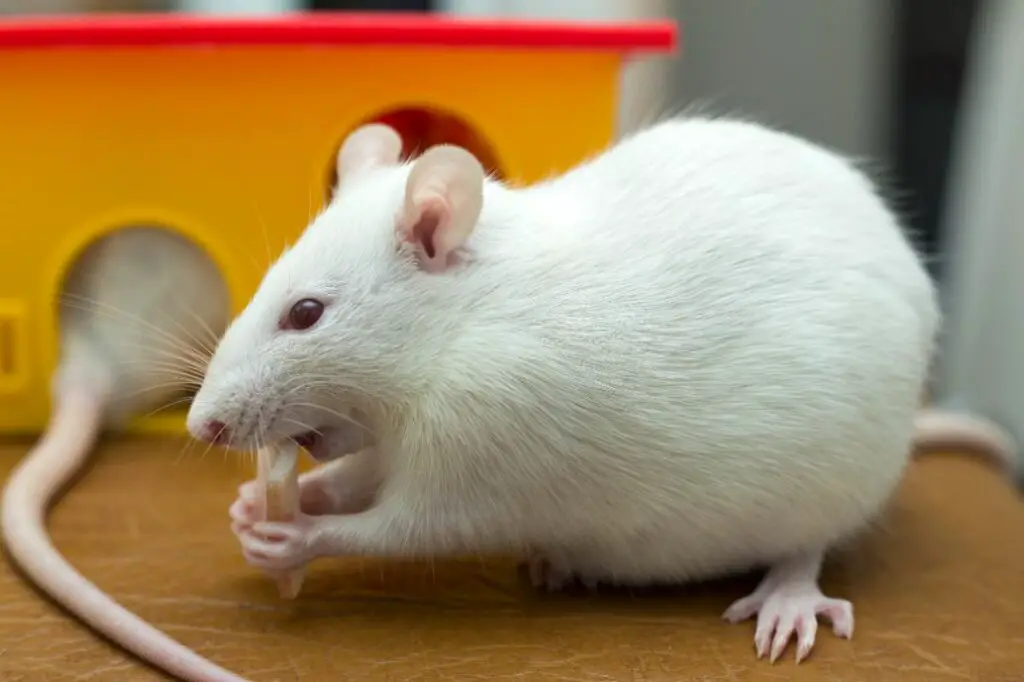As a pet rat owner, I often get asked if rats will overeat or stop eating when they’re full. The answer to this question is not a simple yes or no, as it depends on various factors that influence their feeding behavior.
In this blog post, we will explore the truth behind rodent feeding habits and discuss the factors that influence them.
Rats are social and interactive animals that make great pets. They are omnivorous, which means they eat both plant and animal-based foods. When it comes to feeding, rats can be quite active and enthusiastic, often scurrying around in search of food.
But do they overeat or stop eating when they’re full? Let’s find out.

Understanding the biology of rats and their feeding habits
To understand rats’ feeding habits, we need to look at their biology and the factors that influence their appetite.
The role of hormones in regulating appetite
Hormones play a crucial role in regulating rats’ appetite. Leptin, a hormone produced by fat cells, helps regulate hunger and satiety.
When rats have enough food, leptin levels increase, signaling the brain to reduce food intake.
On the other hand, when rats are hungry, leptin levels decrease, signaling the brain to increase food intake. Insulin, another hormone, also plays a role in regulating rats’ blood sugar levels and appetite.
The impact of diet on rats’ feeding behavior
Diet plays a significant role in rats’ feeding behavior. Rats need a balanced diet that provides them with the right amount of nutrients, vitamins, and minerals.
A diet that is too rich in one nutrient, such as fat or protein, can lead to overeating. Similarly, a diet that lacks essential nutrients can result in rats eating more to compensate for the deficiency.
Factors that influence rats’ feeding behavior
Apart from biology and diet, several other factors can influence rats’ feeding behavior.
Environmental factors
The environment can play a significant role in how much rats eat. A comfortable and safe environment can reduce stress and anxiety, which can reduce the likelihood of overeating.
On the other hand, an uncomfortable or stressful environment can increase rats’ food intake.
Social factors
Rats are social animals and often eat together. Social interaction during mealtime can affect rats’ feeding behavior, with dominant rats eating more than their subordinate counterparts.
Social hierarchy can also influence rats’ feeding behavior, with higher-ranking rats eating more than lower-ranking ones.
Genetics and individual differences
Genetics can also play a role in rats’ feeding behavior. Some rats may have a genetic predisposition to overeat or be less satiated after a meal.
Additionally, individual differences in rats’ personalities and behavior can influence how much they eat.
The dangers of overeating for rats
Overeating can have negative consequences for rats’ health and behavior.
Health consequences of overeating
Overeating can lead to obesity, which can increase rats’ risk of developing health problems such as diabetes, heart disease, and joint problems.
Additionally, overeating can lead to digestive problems such as constipation or diarrhea.
The impact of overeating on rat behavior
Overeating can also affect rats’ behavior. Overweight rats may be less active and playful, leading to a less fulfilling and enjoyable life.
Overeating can also lead to aggressive behavior, as rats may become territorial over food.
Methods for regulating rat feeding behavior
It is essential to regulate rats’ feeding behavior to ensure that they maintain a healthy weight and lifestyle.
Training and conditioning methods
Training and conditioning methods can be used to regulate rats’ feeding behavior. For example, training rats to respond to specific cues, such as a whistle or clicker, can help regulate their food intake.
Additionally, conditioning rats to associate certain foods with negative consequences, such as a bitter taste or an electric shock, can reduce their desire to overeat.
Dietary interventions
Dietary interventions can also help regulate rats’ feeding behavior. Providing rats with a balanced and nutritious diet can reduce their desire to overeat.
Furthermore, feeding rats smaller, more frequent meals throughout the day can help regulate their food intake.
Conclusion
In conclusion, rats’ feeding behavior is complex and can be influenced by various factors such as biology, diet, environment, social factors, genetics, and individual differences. Overeating can have negative consequences for rats’ health and behavior, making it essential to regulate their feeding behavior.
Training and conditioning methods and dietary interventions can be used to regulate rats’ feeding behavior, ensuring that they maintain a healthy weight and lifestyle. As a pet rat owner, it is crucial to be aware of your rats’ feeding habits and take the necessary steps to ensure their well-being.
- How Long Do American Eskimo Dogs Live? Important Factors and Care Tips - September 29, 2023
- Do American Bulldogs Need Grooming? Essential Tips and Care Guidelines - September 29, 2023
- Do Bengal Cats Enjoy Playing? Essential Tips for Keeping Them Active - September 29, 2023